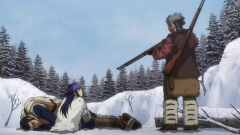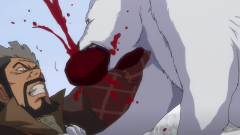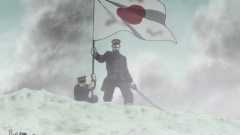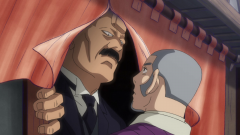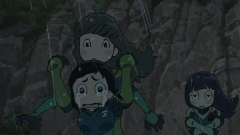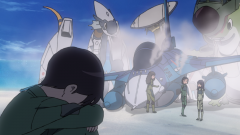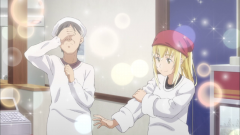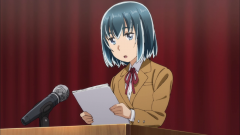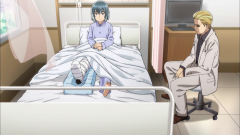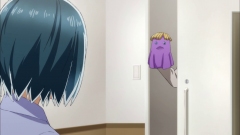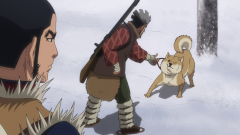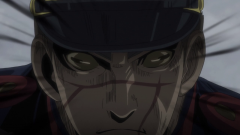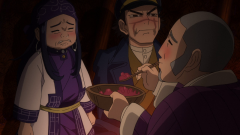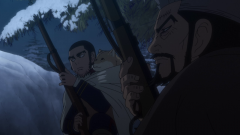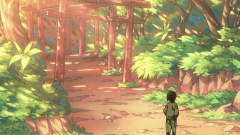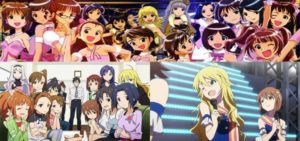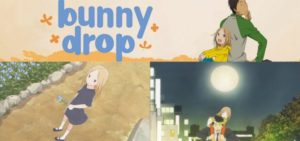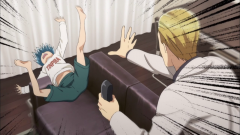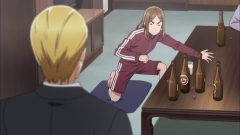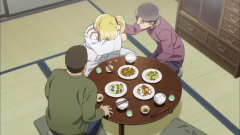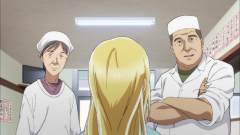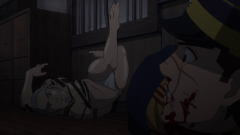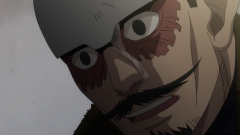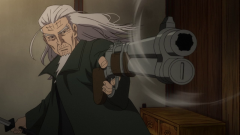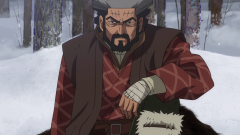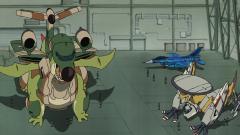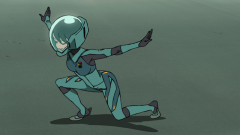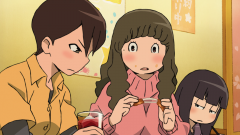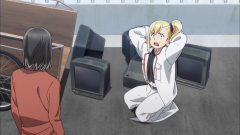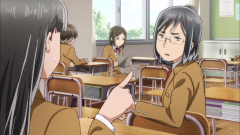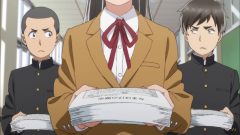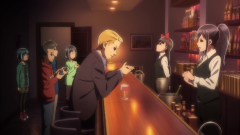[slideshow_deploy id=’26665′]
Before we get to the reviews this time, there’s something that I forgot to mention in the first few posts. In order to come up with the shortlists, I used the information mainly from anichart, MAL’s seasonal anime and this very site’s monthly summaries from psgels, along with some first impressions over ANN. Turn out the most informative source out of these was psgels’ summaries, given not only he covered a large amount of shows, but I can also keep track with how he felt about these shows over time (if you’re still reading this blog psgels, you have my gratitude). The other sources miss out many shows (imagine my frustration when I realized Gosick isn’t listed over anichart). It would help me greatly if any of you readers know some reliable sources concerning anime shows that air in every year. I’ll be very appreciated.
psgels only checked out the first 3 episodes of THE iDOLM@STER, so here is his review for Usagi Drop. Let’s the game begin
THE iDOLM@STER (A-1 Pictures)
Arguably one of the finest specimen when it comes to idol anime, THE iDOLM@STER takes almost no time to introduce us a whooping… 13 rising idol girls, each tick the box of your typical anime archetype and there are several insert songs within an episode, so that there’s always something for everyone. Mild sarcasm aside, this is a show whose appeals are too clearly-defined that just by first few episodes you can easily tell if it’s for you or not. In term of quality, it has fair shares of good and bad. Some might point out the refreshing documentary-style the first episode employs, but for me it further underlines many of the show’s core issues. The said documentary style where the girls answer to some text questions further reminds me of its gameplay mechanics. In addition, the show introduces a very plain self-insert male character who only goes by the name “Producer” and if you take away his eagerness towards helping the girls out, he has no distinct characteristics. The 13 female idols (well, more like 12 + 1, you’d know what I mean if you watch it), on the other hand, may seem overwhelming at first, but each of them has their own personality and has their own growth to develop. These growths can be small for some characters, but most of them are well-developed and in the end, just watching those girls bounce off each other and give some interesting different dynamic when pairing different girls make all their time together such a fun time to watch.
THE iDOLM@STER divides neatly into 2 half, first cour about the 765 Pro when they are at the bottom of the food chain and the latter half about them when the girls are already famous. There’s one thing that you need to know that THE iDOLM@STER plays more like an… idolized version of becoming idols. There are issues and hardships along the way; but noting is as dark as Perfect Blue and the show tends to resolve those conflicts by the sheer optimism power from the main cast. In THE iDOLM@STER, you can see those girls doing many idols activities beside singing like joining a cooking show, having their own air show, or even playing with children. The main theme is not much about following your dream (which it has a fair share of, but Love Live claims the spot there), but more about seeing these team idols as family members and the studio as a home to go back to. At that, it produces some nice, warm moments where the cast, despite their busy schedule, still tries to make time for each other. There are some character-focus episodes that leave more impact than others, chief among them the wedding-photoshoot turns runaway bride madness or the air show that put our idols into some pretty hilarious moments.
The show falls apart, however, whenever the main villain shows up and gives 765 Pro a hard time. He’s the kind of antagonist that the show doesn’t need and the way the show frames him as overly cruel make him a badly-written character all the way. I find myself quite surprise that I enjoy the last arcs when the show goes a tad bit more serious because those reflect the characters’ issues quite well without betraying their own developments. In terms of production, while the actual animation is just average, it more than makes up for it with expressing character expressions and the flat-out impressive hand-drawn performance sequences with many earworm songs to enjoy. Makes me clearly see the difference with today idol shows where they try to cut down the cost with those CG dance sequences. THE iDOLM@STER is, without a doubt, a production that is created with a lot of efforts and cares. While it’s pandering with the mainstream’s taste for mainstream attention, its appeal is so well-defined (I reckon its appeal is similar to K!On) that if you don’t mind 13 girls coming at you at the same time, you’ll have a good time with it.
Rating: 74/100
Usagi Drop (Production I.G)
In a medium that a bit too obsessed with high school settings and teen romance, the topic of raising a child is rare, and to be as good and realistic as this is nothing short of extraordinary. It takes two complete strangers starting on a new phase of their lives together to underscore what parenting and childcare really like. While I have some minor qualms about Usagi Drop: the show ends inconclusively, many life-to-life issues are deal with, but quickly get aside once they resolve the issues (like Daikichi’s job or Rin’s daycare issues) and mostly the financial situation is never a big issue, those complaints are quickly tossed aside compare to the show’s strengths. The main, main, main weapon of Usagi Drop is the solid dynamic of Daikichi and Rin – two lovely individuals in their own rights – and witness how they begin to trust each other and enjoy the time together. Rin is pure bliss. She’s mature, well-behaved and smart for her age, but she isn’t without her own personal problems. Abandoned by her real parents (in one of a grounded depiction of immature mother in the medium), she always has a fear being left alone in the world. And for a girl her age she faces those issues surprisingly well.
But Usagi Drop also nails it at depicting how Daikichi evolves as a father figure. He handles the situations like an adult, he sacrifices many things so that it can work out better for him and Rin. In addition, since he’s inexperienced with this whole raising-a-kid thing, he’s panicking over littlest things. A cold from her makes him nervous, every small aspect that he has no idea to he’d call over his relatives for help. It’s hard to raise a child, that’s for sure, then you realize that every parent has been through those very same situations, and it adds a lot of extra weight. This show, in a way, is a celebration of parenting, of every father and mother out there who deal with nameless listless jobs every single day, most of their efforts never get noticed.
Visual-wise, the pre-opening segments use a crayon-tinted style, which really fits the nature of this show. The atmosphere it produces is strong and solid, plus its resemblance to real-life parenting that make Usagi Drop one of the best slice-of-life show this genre has to offer. The cast all act so natural that you would see these kinds of characters in your real life. In this heart-warming world, not only Daikichi learns from his peers and his family to deal with all the situations, but he also learns from Rin, and likewise, Rin learns from him, and they grow a great deal together. The fact that it ends open-ended also speak a lot to its theme, that parenting is a work that can’t finish in a day or two, but it’s a lifespan process, and both Rin and Daikichi are just in their beginning of the process.
Note: Despite knowing what infamously happens in later volumes, I’ve made up my mind to read the rest of the manga at some points in the future. The time jump might very well contaminate my feeling for Rin and Daikichi, but I don’t want to be the one who says I’m uncomfortable without reading it and seeing for myself first. So yeah, at least I’m prepared for whatever comes, let it come.
Rating: 91/100
With these reviews done, I regret to say that this 2011 Anime Retrospective will be on hiatus for a foreseeable future. I’m enjoying watching and reviewing them by all mean, but lately, I’ve been thinking about making a movie blog, given my root has always been about cinema. If it ever happens, rest assured that I’m not leaving this site. I’m still pretty much up to weekly reviews, but side-project like this will have to put into the sideline. Currently, I want to do some movie projects first before coming back to this one (I know, BIG TALK since the blog doesn’t even exist yet. It’s just me and my blind enthusiasm at this point). I’ve received healthy responses from you guys for this project – which I am very grateful – so, thanks again for supporting this project after all this time. I’m still intended to come back and finish this so until then, I suppose. Arigatou.

